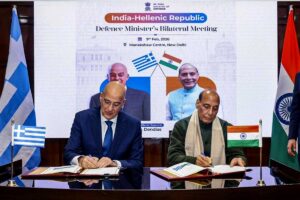Vladimir Putin wins fifth term as President of Russia with a record percentage
Vladimir Putin has secured his fifth term as president of Russia with a record-breaking percentage, amid protests and allegations. What does this victory mean for developments at the national and international level?
The polls in Russia closed after three days of voting (15-17 March), but the result was a foregone conclusion before they even opened.
In a country whose constitution until recently limited the terms of a president to two, Vladimir Putin secured his fifth term amid protests, controversy and allegations of fraud, opacity and irregularities. The elections, the first since the invasion of Ukraine in February 2022, were intended both to restore Putin’s image and to secure popular support for the war.
However, the result is far from reassuring for an anxious – mainly due to the protracted conflict – Russia, with citizens worrying – among other things – about the next day for the economy and their soldiers.
Although the 71-year-old Russian leader’s victory was a foregone conclusion, his victory exceeded predictions. After securing 63.4% in 2012 and 76.7% in 2018, Vladimir Putin achieved a figure close to 87%, exceeding analysts’ estimates of around 80%.
“Presidential elections in Russia have long served as a way of legitimising an entire system. However, such a high figure for Mr Putin – who has amended the constitution to keep him in the Kremlin until 2036, when he will have reached 83 – threatens to undermine that legitimacy. It could also raise questions in the increasingly authoritarian Kremlin about why Russia needs such an exercise in fantasy,” comments Neil McFarkuchar of the New York Times.
“National Unity”
Although the Kremlin attempts to project an image of national unity, control and political stability, reinforced by well-orchestrated electoral processes, three events related to the opposition have been enough to disturb this image.
The first was last January, when thousands of Russians across the country formed queues to sign a call for the candidacy of Boris Nadezhdin, a liberal politician who was excluded from the ballot because of his opposition – among other things – to the war in Ukraine.
The second occasion was, in February, the sudden death of Alexei Navalny in a penal colony in the Arctic. After days of silence about his body, Navalny was buried in Moscow in the presence of thousands of people who defied the orders and warnings of the authorities by vigorously chanting against Putin and the war in Ukraine.
The third event that damaged the image of national calm and unity promoted by the Kremlin was the massive turnout of Russians at polling stations, both inside and outside the country, at 12 noon on Sunday, in a ‘legacy’ protest against Navalny.
The high “vote of confidence” for politics in Ukraine
Putin’s already high ratings were even higher in Ukraine’s annexed regions (Donetsk, Lugansk, Zaporizhzhya, Kherson), where “there were elements of coercion, with election representatives in many cases carrying ballot boxes to people’s homes accompanied by an armed soldier,” the NYT writes.
Putin never acknowledged that he started a war by invading Ukraine. Instead, he claims he was forced to launch a “special military operation” to prevent the West from using Ukraine as a “Trojan horse” against Russia.
That is why the high turnout is perceived as a “vote of confidence” by the Russians on his Ukraine policy.

Loyalty to the “gun and butter” doctrine
In his annual State of the Nation address to Russia’s political and military elite in February, Putin evangelised “guns and butter” (a “paraphrase” of a macroeconomic model that does not prioritise one national need over another, but promotes both defence and social spending for the common good).
Putin asserted that Russia could carry out its war aims by investing in the economy, infrastructure and long-term goals.
As government statistics show, although around 40% of public spending was channelled to military purposes, Russian economic growth was boosted by 3.6% in 2023 – despite Western sanctions.
Russian concerns about future developments
The post-election period in Russia is often followed by unpopular politics. For example, after the 2018 elections, Putin raised the retirement age. Today, after two years of war in Ukraine, Russians are concerned about whether the conflict in their region could mean new conscription measures or intensified oppression at home.
Although Putin has repeatedly denied the scenarios of a new military conscription, the small territorial gains in Ukraine, the high blood toll and the operational stalemate on the battlefield do not rule out policy change.
However, as foreign media and commentators point out, this staggering result and the elimination of political opponents undermine the political robustness that Putin preaches.
Many refer to the election process as the least transparent ever. Never before have there been so few independent monitors with such limited access to Russian polling stations.
In dozens of regions, in fact, the process was conducted electronically, which independent observers believe facilitated vote tampering.












